|
|
|
Sort Order |
|
|
|
Items / Page
|
|
|
|
|
|
|
| Srl | Item |
| 1 |
ID:
135808
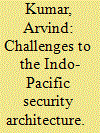

|
|
|
|
|
| Summary/Abstract |
India should play an active role in seeking to address the challenges to the creation of a new and acceptable Indo-Pacific security architecture. Over the years, the aspirations and ambitions of India have grown. it has been acknowledged as a predominant power in south Asia, and an emerging power in the whole of Asia. Its desire to be a leading power in the Indian Ocean Rim cannot be questioned. However, India cannot shy away from assuming responsibilities and playing a more proactive and positive role, especially if it desire to an influential player in Asian and world affairs. India’s strategic orientations need to be adjusted to go beyond the Indian Ocean region to the Pacific Rim.
|
|
|
|
|
|
|
|
|
|
|
|
|
|
|
|
| 2 |
ID:
135812


|
|
|
|
|
| Summary/Abstract |
Competition has become a driving force in today’s globalised world. Measures such as deregulation, liberalization and privatization are necessary, but not sufficient to ensure the efficient functioning of markets. The market distortions deprive markets of their ability to deliver efficient result, adversely impact growth and hurt the poor most of all through higher prices. Hence, there is a need for a robust competition law to protect and nature the competitive process of the economy.
|
|
|
|
|
|
|
|
|
|
|
|
|
|
|
|
| 3 |
ID:
135805
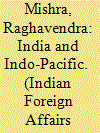

|
|
|
|
|
| Summary/Abstract |
While the Pacific pole of the Indo-Pacific is important, the primacy of the Indian Ocean in the national strategic calculus is far more critical due to energy due to energy dependency on the Middle East, increasing economic linkage with Africa, and the security of major sea lines of communication passing through the western ocean.
The Indian strategic policy framework should factor the nuances of emerging multi-polarity, and deepening of vertical and horizontal intermeshing brought about by the globalization process. While the stance of ‘strategic autonomy’ remains inviolate, the tenets of maintaining equidistance and balance among the power centres may prove to be constraints. The simultaneous management of mutually opposing paradigm across the strategic threads of politics-diplomacy-economics-security could be best served by a ‘functional transitional approach’ instead of a rigid straight-line, single point of departure policy.
|
|
|
|
|
|
|
|
|
|
|
|
|
|
|
|
| 4 |
ID:
135810
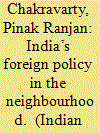

|
|
|
|
|
| Summary/Abstract |
India’s foreign policy started attracting renewed global attention since the beginning of the economic reform in 1991. With high rates of economic growth during the last two decades-almost 7.5 per cent on the average, through down to sub 5 per cent in last two years-India’s global trade today contributes over 50 per cent of its GDP, as compared about 3 per cent before. In PPP terms, India is the world’s third largest economy after the USA and China. India’s growing profile on the international stage has naturally led to question about the role India seeks to play, or should play, regionally and internationally. Clearly, the world expects India to play a larger role, commensurate with its size and growing power. Consequently, the question has arisen about India’s own perception and assessment of its international role, and the nature of its global engagement. This process has led to a changing consensus and nuancing of India’s foreign policy thinking and objectives.
|
|
|
|
|
|
|
|
|
|
|
|
|
|
|
|
| 5 |
ID:
135813
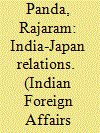

|
|
|
|
|
| Summary/Abstract |
India and Japan are both important players in Asian political scene. During the cold war era, ideological difference and alignment perhaps prevented both countries from closely honing their economic and strategic complementarities. After India liberalized its economic policies in the early 1990s, this equation changed noticeably, and moved towards a stronger relationship in economic and strategic domains. through the growth momentum was not at the desired level-as compared to India’s economic engagement with, for example, China, South Korea and Australia- recent political changes in both the countries is expected to pave the way towards greater cooperation. Moreover, the strategic factor seems to have emerged as the prime driver in the bilateral ties between the two countries.
|
|
|
|
|
|
|
|
|
|
|
|
|
|
|
|
| 6 |
ID:
135807
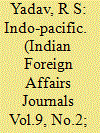

|
|
|
|
|
| Summary/Abstract |
India’s interest in the Indo-Pacific region seem to be in terms of both its foreign policy priorities and its lack of capability as a major power. Through it is making progress in attaining the status of a rising power, yet it has to establish such a claim through a threefold manifestation in the form of its hard power position; its soft power status; and its demonstrative capabilities. Besides, Indian interests are more or less limited towards its immediate and extended neighbourhood.
|
|
|
|
|
|
|
|
|
|
|
|
|
|
|
|
| 7 |
ID:
135809
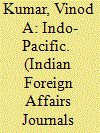

|
|
|
|
|
| Summary/Abstract |
Inclusion of the IOP in the Indo-Pacific paradigm only underlines the coming future of great powers attempting to spread their writ in this expanse. Already reeling under continental security challenges, a looming economic crisis, and a tardy defence modernization process, India will need to toil in the coming years to sustain whatever leverage it already has. while economic consideration will be a driving factor in India’s efforts to enhance cooperative relations with major actors in the Pacific, the expectation is that it will be a mere fringe player in the strategic dimensions of indo-pacific for some time to come.
|
|
|
|
|
|
|
|
|
|
|
|
|
|
|
|
| 8 |
ID:
135803


|
|
|
|
|
| Summary/Abstract |
The emergence of India in the 21st century completes the creation of a composite region which could best be described by the term ‘Indo-Pacific’
As the global fulcrum of power shifts towards Asia, it would also bring about change in the dynamic within the Indo-Pacific region. Taking cognizance of this, we would need to work towards creating a security construct, and an economic architecture that leverages the civilization linkages to expand cooperation and built partnerships across the Indo-Pacific. India naturally will be an important participant in the process.
|
|
|
|
|
|
|
|
|
|
|
|
|
|
|
|
| 9 |
ID:
135806
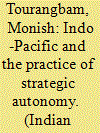

|
|
|
|
|
| Summary/Abstract |
What makes the Indo-Pacific construct appealing to Indian policymakers and the strategic community is that it gives ample scope for the practice of India’s strategic autonomy. It gives space for it to drive the emerging debates as a more direct stakeholder rather than being seen as a co-opted partner in America’s rebalancing strategy in the Asia-pacific region. while the term ‘strategic autonomy needs to be defined based on India’s capabilities and aspirations, it will augur well for India’s own interests to take into confidence other countries in the region (besides the major powers) regarding the viability of this new geopolitical and geo-economic construct. India’s rising capabilities and a sober analysis of its strategic autonomy denotes India’s ability to take foreign policy steps commensurate with its national interests. This includes striking partnerships and coalitions as and when it suits India’s priorities of balancing uninterrupted internal development amidst a stable and secure external environment in the Indo-Pacific region.
|
|
|
|
|
|
|
|
|
|
|
|
|
|
|
|
| 10 |
ID:
135804
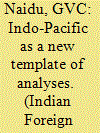

|
|
|
|
|
| Summary/Abstract |
The Indo-Pacific enormous scope for regional multilateralism to play a more important role than it has so far. Once it is recognized that economic cooperation, shared prosperity, and security challenges are no more sub-regional in nature but span the entire region, the Indo-Pacific will be better appreciated. Thus, the Indo-Pacific needs to be viewed in the larger perspective of offering more opportunities for cooperation than competition. Moreover, it is reflection of the rapidly changing geopolitical reference points. Thus, instead of looking at the Indo-Pacific idea with skepticism, it should be welcomed and promoted.
|
|
|
|
|
|
|
|
|
|
|
|
|
|
|
|
| 11 |
ID:
135811
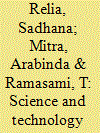

|
|
|
|
|
| Summary/Abstract |
In today’s inter-connected world, nation states develop their foreign policies to define their relationship with other countries, and for addressing all issues of international relevance. Foreign policy provides the broad framework that helps pursue a nation’s national interest in global affairs at the bilateral, regional, and multilateral levels. Thus, a nation state tries to negotiate and influence the behavior of other states through the instruments of its foreign policy. Importantly, today a nation’s foreign policy needs to position the self-interest of the country in the emerging global economy. Contrasting priorities and self-interests of different nation states become the basis for disagreements. Diplomacy is a powerful tool of great relevance when there is disagreement among nation states. Persuasion through dialogue and engagement is the major method used in international diplomacy. Diplomats are expected to display an extraordinary ability in the art of persuasion in order for them to become successful negotiators.
|
|
|
|
|
|
|
|
|
|
|
|
|
|
|
|
|
|
|
|
|